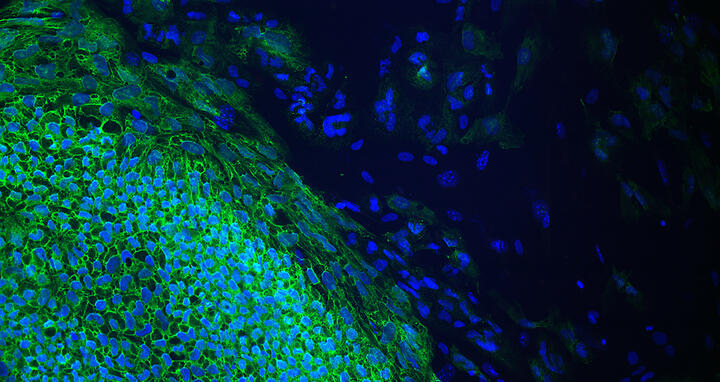Seeing through the Eyes of the Other
Emilia Tikka in the lab
Emilia Tikka has been chosen as Artist in Residence at Max Delbrück Center for Molecular Medicine in the Helmholtz Association (MDC) out of 40 submissions from over 12 countries. Her artistic concept, the DORIAN-GRAY-KIT – Trajectories of Rejuvenation between Self-Experiments and CRISPR-cas9 is a poetic scenario about a possible future of genome editing technologies and the human obsession of youth. The residency project is concerned with the human desires and dreams driving current biotechnology from institutional laboratories to citizen science tinkerers. The conceptual aim of this speculative scenario is to engage the public with a fundamental antagonism: the constant loop of decay and rebirth as an enigmatic molecular process in all the living beings and the human drive to interfere to these processes with technical means.
Emilia Tikka will spend two months in July and August at MDC’s CRISPR lab to work closely with the researchers. She will draw on her experiences in the laboratory with the CRISPR-Cas9 research team to further develop her artwork engaging with the philosophical and societal dimensions of genetic engineering.
The biomedical research center partnered up with STATE, a Berlin-based Art and Open Science initiative, collaboratively setting in motion the first European artist residency on CRISPR-Cas9.
Societal dimensions of an efficient biotechnology tool
Celebrated as a milestone in biotechnology, a lot of hope is projected in the development of CRISPR-Cas9 as a powerful method for genome editing, for gene therapy in humans and precise genetic manipulation of plants and animals. At the same time, concerns around possible hazards are equally present. This residency aims at exploring the societal dimensions of this new efficient tool.
The residency is lined up in a variety of initiatives undertaken by STATE aiming at guiding an open dialogue around critical issues regarding the cultural impact of scientific research. The resulting artwork will be exhibited at STATE Studio Berlin in late October, a gallery project developed in partnership with Wissenschaft im Dialog.
Funding for the residency is provided by the EU project ORION, an international consortium, including the MDC that leads the work package on training. The project is exploring ways in which research and funding organizations in life sciences and biomedicine can open up the way they fund, organize and do science. The residency at the MDC will inspire and contribute to the ORION public dialogue and is aiming to engage society in discussions of risks and opportunities presented by disruptive technologies, such as CRISPR-Cas9.
About Emilia Tikka
Emilia Tikka is a designer, artist and filmmaker – originally from Finland and currently based in Berlin. Her interdisciplinary design and research practice explores philosophical dimensions and cultural implications of novel biotechnologies such as synthetic biology and genome editing technology CRISPR-cas9. Her methods of research vary from designing objects, constellations, concepts and fictions to writing and hands-on laboratory experiments.
Her design and art works – ranging from objects, clothing, sculptures – have been awarded and exhibited in several international design exhibitions and art museums including Västerås Art Museum in Sweden, EMMA Contemporary Art Museum in Finland, Center of Contemporary Poland, MOBA13 Design Biennale in Netherlands curated by Li Edelkoort, Exhibition and book release by Vilaindustrie in Florence, Italian Vogue’s Young Talents event in Milan and Helsinki Technical Museum. Her recent film project Eudaimonia has been selected in international film festivals such as Shorts on Tap in London and as a finalist in the European Cinematography awards. After studying in Helsinki she received her MA in industrial design at University of Arts Berlin.
Artist and Team
Artist: Emilia Tikka
Curatorial Team: Dr. Christian Rauch (STATE), Stefanie Greimel (STATE), Johanna Teresa Wallenborn (STATE), Dr. Ralph Kühn (MDC), Dr. Luiza Bengtsson (MDC)
Press Contacts
Please contact us for further information. The curatorial team, researchers and invited artist are available for interviews.
STATE
Johanna Teresa Wallenborn
jw@statefestival.org
Phone: 0157-5555 4824
Max Delbrück Center for Molecular Medicine in the Helmholtz Association (MDC)
Communications Department
Jana Schlütter
Jana.Schluetter@mdc-berlin.de
Phone: 030-9406 2121
Partner: Max Delbrück Center for Molecular Medicine in the Helmholtz Association
Supported by the EU-funded Project “ORION”, Grant Agreement No. 741527
Partners
The MDC
The Max Delbrück Center for Molecular Medicine in the Helmholtz Association (MDC) is an internationally renowned biomedical research center in Berlin. Named after Max Delbrück, one of the founders of molecular biology and a Nobel Prize Winner, the institute is dedicated to linking basic science with clinical research. Currently the institute employs more than 1660 people from 60 countries; over 1300 of those are directly involved in research. www.mdc-berlin.de
ORION – Open Science I Horizon2020
Nine leading European research institutes, national funding bodies, companies and civil society organizations have joined forces in the EU project “ORION” to find new ways to increase social participation and transparency in research. Through co-creation experiments, benchmarking and training activities, ORION aims to trigger evidence-based institutional, cultural and behavioral changes towards Open Science in Research Funding and Performing Organizations. ORION runs from May 2017 to April 2021 and has received funding from the European Union’s Horizon 2020 Science with and for Society (SWAFS) Work Program.
STATE
STATE is a Berlin-based festival and studio for open science, art and innovation. Founded in 2014 out of Paul-Drude-Institute, STATE stands for a new way of connecting people with science: participatory, interdisciplinary and inspiring. Integrating research, technology and culture in its thinking, STATE explores current developments in science where cutting edge research transforms society. It creates a meeting ground for science and the public, where scientific inquiry meets artistic expression.
Next to international projects and a temporary gallery project in Los Angeles in 2017, STATE now opens its first permanent art and science gallery in Berlin from October 2018. Again, the focus is on creating an open and vibrant forum for public discussion of current, socially relevant developments in scientific research and its impact on society. STATE Studio is supported and developed in partnership with Wissenschaft im Dialog, the German umbrella organization for science communication.





